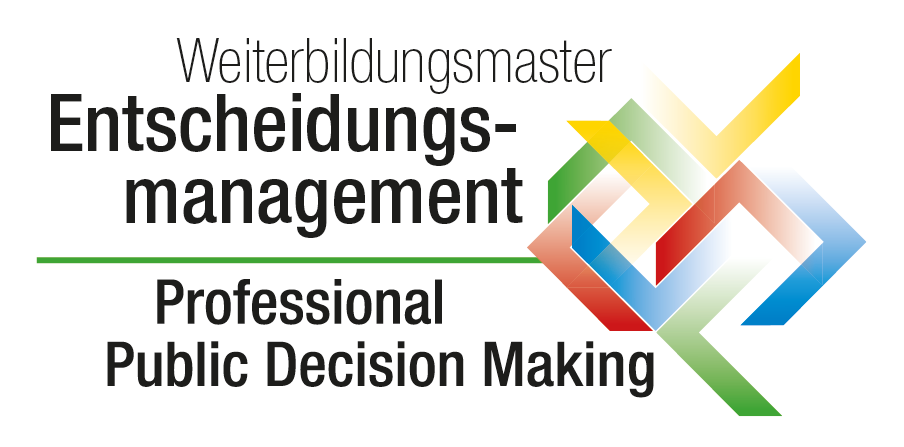The extra-occupational and interdisciplinary master's program "Decision Management" is unique in Germany in offering systematic and scientifically based training for public decision-making.
Professional Public Decision-Making

Take the right actions for your career
Learn to decide
Modern societies are driven by decision-making. With the master's program "Professional Public Decision-Making" (EMMA) you will acquire the competence to manage multi-faceted decision-making processes.
The master's program provides expertise in dealing with complex decision-making problems interdisciplinarily. It qualifies for leadership positions in public administration, political parties, as well as in public and private companies and organizations as NGOs, associations etc.
Find out more about EMMA, the innovative degree program that first started at the University of Bremen in the winter semester 2015/2016.
Decision Making at the University of Bremen - overview of all offers
Make a good decision - with EMMA, the extra-occupational master's program "Professional Public Decision Making".
With EMMA you qualify for a variety of responsible positions - for example in public administration, politics, in companies or in NGOs. You will acquire comprehensive skills for analyzing and solving complex decision-making situations. In an interdisciplinary study course, a multitude of new perspectives will open up for you - studying alongside working with a pronounced practical orientation.
The innovative profile aims to meet the increasing demand for competent decision-makers.
The core idea of EMMA is to provide a systematic scientific education for decision-making by bringing together different scientific disciplines:
» economics
» political sciences
» law
» philosophy
» sociology
» psychology
The program enables the students to develop solutions to complex problems through the use of multidisciplinary collaboration.
The program is aimed at professionals whose everyday work is characterized by complex decision-making situations.
It is directed at different target groups, e.g.:
» Experienced managers who want to expand their knowledge of complex decision problems and strategic decision management.
» Junior executives who want to acquire knowledge and competencies for dealing with complex decisions for their everyday professional life and use them for their career path.
» Professionals who have to deal with complex challenges and decision-making problems in their daily work.
» The offer is aimed at people in the public sector as well as in the private sector
Admission requirements are in general a first professional university degree (Bachelor, Diplom or Magister) and at least two years of professional experience.
In exceptional cases, applicants without an undergraduate degree can also be admitted if they have a university entrance qualification and can provide evidence of at least five years of professional experience (of which at least two years must have been in a field that is usually filled by university graduates).
Quick information
» Decision-making competence for public administration, politics, associations, NGOs as well as public and private companies
» Degree: Master of Arts (M.A.)
» Continuing professional development & practice-oriented studies
» Interdisciplinary teaching & interprofessional learning
» Duration of study: three years (six semesters)
» Costs: 18.000 Euro
» Start: every autumn

The master's degree program qualifies students to assume management positions
» in public administration
» in political parties
» in non-governmental organizations (NGO's),
» in associations,
» as well as in public and private companies.
Competence profile
You will acquire knowledge and skills to come to reflective decisions in complex decision-making situations:
» Professional knowledge of the represented study disciplines for the management of decisions
» Instruments for the acquisition, analysis and evaluation of complex decision problems
» Analysis of the respective perspectives and use for finding solutions; use in the context of your professional occupation
» Knowledge and application of practical decision-making and decision-management methods
» Repertoire to improve your personal decision-making behavior
» Dealing with problems in teams
Study organization
- Modularized study program
- Duration of study: 3 years (6 semesters)
- Flexibility through attendance blocks and guided self-study (blended learning)
- approx. 60 attendance days (in total)
Application
- Application deadline for each winter semester is April
Overview of study modules
(9 Credits, Prof. Dr. Thorsten Poddig)
- Fundamentals of decision theory
- Fundamentals of game theory
- Application to concrete decision problems
(6 Credits, Prof. Dr. Dagmar Borchers)
- Overview of basic moral theories and concepts
- Moral reasoning in different contexts
- Logic and semantics of moral judgments
- Normative conflicts in dealing with value conflicts
(18 Credits, Sandra Kohl)
- Consolidation and reflection of what has been learned and experiences from studies and practice
- Exchange of experiences, problems and current topics and issues
- Regular individual counseling and feedback
Compulsory elective modules (Modular system, in total 12 Credits, Coordination: Sandra Kohl)
For instance
- Seminars and workshops for the development and expansion of key competencies (e.g. conflict management, intercultural competencies and communication training).
- Refreshing and/or deepening of specialized and practical knowledge as well as methods (e.g. methods of scientific work, project management and digital media law)
- Excursions and study trips (e.g. to Berlin, Brussels, etc.)
(9 Credits, Prof. Dr. Uwe Schimank)
- Knowledge of empirical decision research with a focus on "decisions in organizations"
- Rationality levels of decision making in organizations
- Application to concrete decision-making situations in the professional environment
(6 CP, Prof. Dr. Frank Nullmeier)
- Normative theories of governance, governance structures and democratic legitimacy
- Analysis, explanation and evaluation of political and administrative decision-making processes at local, national and European level
- Criteria for the evaluation of decision-making processes, tools for the analysis of political-administrative decision-making processes and results
(9 Credits, PD Dr. Ralf Tils)
- Analysis of complex decision-making situations in the area of conflict between factual, political, economic, legal, administrative and communicative requirements in practice
- Instruments of strategic decision management
(6 Credits, Prof. Dr. Dagmar Borchers
- Ethics of personalized scoring systems
- Privacy: Big Data, Tracking and Smart Systems
- Accessibility, participation and informational self-determination
- Algorithm ethics
- Ethics in AI and robotics, with a focus on automated administrative decisions
(9 Credits, Prof. Dr. Dagmar Borchers)
- Interdisciplinary and interprofessional project work (in groups)
- Processing of questions in connection with the professional practice of the students
- Problem-oriented learning
- Active supervision and support of the project teams by teachers
The module is conducted in a team-teaching format, i.e. with teachers from different disciplines.
(6 Credits, Prof. Dr. Felix Herzog)
- Introduction to legal thinking and legal decision making
- Law in its social and political context
- Consideration of legal decision-making in political, economic and ideological contexts
(6 Credits, Prof. Dr. Frank Nullmeier)
- Supportive exchange between students and/or with lecturers during the preparation of the Master's thesis
- Development of a master exposé
(24 Credits)
- Preparation of the Master's thesis (final paper)
- Presentation in a final colloquium
- Supervision by reviewers individually chosen by the students
More information
Contact
Counceling & Study organization
Maren Böttcher
+49 421 218 61621
Application & admission
Kira-Marie Badura
+49 421 218 61626
Or send an email to
emmaprotect me ?!uni-bremenprotect me ?!.de
See also
» our second consecutive and full-subject master's degree, MAKE
» our Decision Research Center

